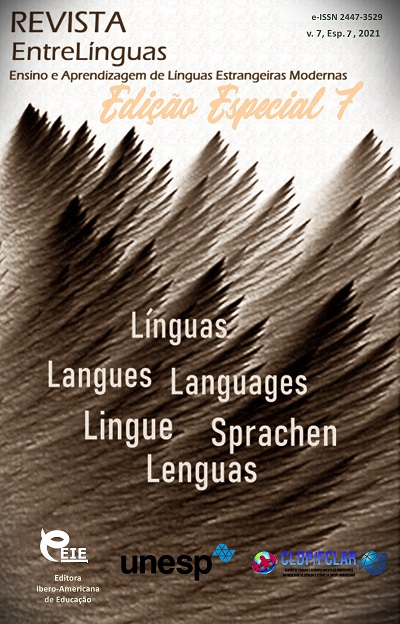Proyecto de lingüística histórica de estudios esclavos de 1958
DOI:
https://doi.org/10.29051/el.v7iesp.7.16269Palabras clave:
Estudios eslavos, Lingüística histórica, Identidad nacional, HistoriografíaResumen
El artículo explora las paradojas de la metodología y los contextos políticos del proyecto de lingüística histórica de los estudios eslavos, que fue declarado oficialmente durante el IV Congreso Internacional de Eslavos (Moscú, 1958). Los autores exploran este significativo proyecto de lingüística histórica desde el punto de vista de la historia intelectual, a través del problema de la formación de ideas de los investigadores sobre el tema, el método y el metalenguaje de los estudios eslavos, que ha demostrado ser esencial en el estudio. de la historia de esta disciplina. El análisis semiótico de todo el cuerpo de fuentes como un solo texto de ideología se utiliza para lograr el objetivo del estudio. El proyecto de lingüística histórica de la eslavística (1958) es un hecho de la historia de la disciplina y la ideología que revela la relación entre la metodología de la investigación y las prácticas de poder y proyectos globales para construir la identidad nacional.
Descargas
Citas
Antonova, N.V., Myagkov, G.P., & Nikolaeva, O.A. (2019). Genesis problem of philosophical thought in spanish historiography”, Utopia y Praxis Latinoamericana, 24(5), 65-71.
Belov, M.V. (2007). At the origin of Serbian national ideology: mechanisms of formation and specifics of development: end of XVIIIth - mid-30s of XIX century, St. Petersburg: Aleteya, 540 p.
Bukharaev, V.M., Myagkov, G.P., & Nabiev, B.R. (2016). The philistine in Russian province at the junction of XIX and XX centuries: Modernization measurement”, Man in India, 96(3), 813-820.
Dyurishin, D. (1993). Problems of special interliterary communities, Moscow: Nauka; Vostochnaya literature, 264 p.
Lapteva, L.P. (2005). History of Slavic studies in Russia in the 19th century, Moscow: Indrik, 848 p.
Mayorova, O.N. (2001). Slavic Congress of 1867: The metaphors of celebration”, New Literary Review, 51, 89-110.
Nedashkovskii, L.F. (2009). Economy of the Golden Horde population. Anthropology & Archaeology of Eurasia, 48(2), 35-50.
https://doi.org/10.2753/AAE1061-1959480203
Nedashkovsky, L.F. (2012). Golden Horde Antiquities: The development of research ideas. Acta Archaeologica, 83(1), 225-255.
https://doi.org/10.1111/j.1600-0390.2012.00690.x
Nedashkovsky, L.F. (2014). Agriculture, Cattle Breeding and Trade in the Golden Horde Based on Data from Written Sources. Terra Sebus: Acta Musei Sabesiensis, Special Issue. Russian Studies. From the early Middle Ages to the present day, 291-303.
Nedashkovsky, L.F. (2015). Trade in the Golden Horde Volga Region”, Journal of Sustainable Development, 8(7), 199-206. https://doi.org/10.5539/jsd.v8n7p199
Nedashkovsky, L.F. (2016). Intensity of the economic development of the lower Volga region during the golden horde epoch (by the materials of the cities' environs). Stratum Plus, 6, 151-162.
Nedashkovsky, L.F. (2018). Chemical composition of non-ferrous artifacts from the Golden Horde settlements of the northern areas of the Lower Volga region. Stratum Plus, 6, 243-254.
Nedashkovsky, L.F., & Nedashkovskaya, N.I. (2016). The History of Study of Slavic Antiquities by the First University Slavists of Russia in the Context of Nation-Building Ideas Development. Man in India, 96(3), 719-726.
Nedashkovsky, L.F., & Nurkhamitov, M.R. (2019). Historical characteristics of the Golden Horde city. Opcion, Ano 35, Especial, 23, 288-302.
Nedashkovsky, L.F., & Shigapov, M.B. (2019). Arms and horse harness from Bagaevka settlement. Stratum Plus, 5, 167- 177.
https://doi.org/10.31857/S086960630008260-5
Nedashkovsky, L.F., Sitdikov, A.G., & Asylgaraeva, G.Sh. (2018). Ad memoriam A.G. Mukhamadiev (1933–2018). Povolzhskaya Arkheologiya, 2(24), 348-353. https://doi.org/10.24852/pa2018.2.24.348.353
Prokof’eva, N.A. (1980). International Commission on the History of Slavistics”, Slavic studies and Balkan studies abroad: Compendium of articles and materials, Moscow: Nauka, 34- 39.
Repina, L.P. (2012). National temperament’ and ‘the image of the other. Dialogue with time, 39, 9-19.
Sibinovich, M. (1995). Some topical issues of modern Slavistics”, Bulletin of the Moscow university. Series 9. Philology, 6, 21- 31.
Wolff, L. (1994). Inventing Eastern Europe: The Map of Civilization on the Mind of the Enlightenment, Stanford: Stanford University Press, 419 p.
Yagich, I.V. (2003). The history of Slavic philology: to the study of the discipline. Reprint of 1910, Мoscow: Indrik, 976 p.
Descargas
Publicado
Cómo citar
Número
Sección
Licencia

Esta obra está bajo una licencia internacional Creative Commons Atribución-NoComercial-CompartirIgual 4.0.
Os manuscritos aceitos e publicados são de propriedade da Revista EntreLínguas. Os artigos publicados e as referências citadas na Revista EntreLínguas são de inteira responsabilidade de seus autores.
Transferência de direitos autorais – autorização para publicação
Caso o artigo submetido seja aprovado para publicação, já fica acordado que o(s) autor(es) autoriza(m) a UNESP a reproduzi-lo e publicá-lo na EntreLínguas, entendendo-se os termos “reprodução” e “publicação” conforme definição respectivamente dos incisos VI e I do artigo 5° da Lei 9610/98. O artigo poderá ser acessado pela rede mundial de computadores (Internet), sendo permitidas, a título gratuito, a consulta e a reprodução de exemplar do artigo para uso próprio de quem a consulta, desde que haja a citação ao texto consultado. Essa autorização de publicação 328 EntreLínguas, Araraquara, v. 1, n .2, p. 323-328, jul./dez. 2015 não tem limitação de tempo, ficando a UNESP responsável pela manutenção da identificação do(s) autor(es) do artigo. Os artigos publicados e as referências citadas na Revista EntreLínguas são de inteira responsabilidade de seus autores.











